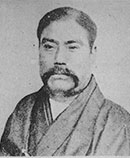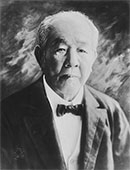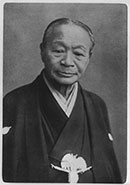Chapter 5 Financial circles in Meiji era
IWASAKI Yataro, 1834-1885
 Iwasaki was an entrepreneur during the Meiji era. He lived in the Tosa Domain, where he engaged in trade with the domain administrators such as Yoshida Toyo and Goto Shojiro. After working for the administration-operated Tosa Shokai (Tosa Trading Co.), he established Mitsubishi Shokai (Mitsubishi Trading Co.). As a close associate of Okubo Toshimichi, Okuma Shigenobu, and others, he held an exclusive right to operate a maritime shipping business under the careful protection of the government, thereby laying the foundation for what would become the Mitsubishi Zaibatsu.
Iwasaki was an entrepreneur during the Meiji era. He lived in the Tosa Domain, where he engaged in trade with the domain administrators such as Yoshida Toyo and Goto Shojiro. After working for the administration-operated Tosa Shokai (Tosa Trading Co.), he established Mitsubishi Shokai (Mitsubishi Trading Co.). As a close associate of Okubo Toshimichi, Okuma Shigenobu, and others, he held an exclusive right to operate a maritime shipping business under the careful protection of the government, thereby laying the foundation for what would become the Mitsubishi Zaibatsu.
70 Iwasaki Yataro shokan, March 4, 1877[Ueno Kagenori Papers (deposit): 7-2-2]
This letter was written by Iwasaki to Japan’s minister extraordinary and plenipotentiary to the United Kingdom, Ueno Kagenori. In the first part of the letter, Iwasaki asks Ueno to provide aegis for the sons of two Mitsubishi employees, who have come to the UK to study. In the latter part of the letter, he provides information about the Satsuma Rebellion, about which Ueno—who was from Kagoshima—was most likely deeply concerned. Mitsubishi provided the Japanese government with 38 ships for military transportation, so Iwasaki likely had much information about the situation. This relationship with the government was a significant factor in Mitsubishi’s growth into a major industrial company.
 Foreign students and danshaku imo
Foreign students and danshaku imo
One of the two students studying in the UK was Kawada Ryukichi, son of Kawada Koichiro, who was a highly capable subordinate of Iwasaki’s. The 21-year-old Ryukichi met a girl named Jenny in the UK and the two fell in love. Ryukichi eventually returned to Japan without marrying Jenny, where he worked for many years in shipbuilding business. But he never was able to forget Jenny nor the taste of the potatoes that he had first eaten with her in the UK, and he made great efforts to popularize potatoes as a foodstuff in Hokkaido. Since Ryukichi had inherited the title of baron from his father, the potatoes he raised were soon nicknamed danshaku imo (baron potato) and even today is Japan’s most popular type of potato.
SHIBUSAWA Eiichi, 1840-1931
 Shibusawa was an entrepreneur during the Meiji and the Taisho eras. He worked for the Hitotsubashi family and eventually became a retainer of the Shogunate. As a member of the Shogunate’s delegation to the Paris International Exposition, he visited Europe and the Americas, after which he was appointed to work in the newly created Ministry of Finance and later founded the Daiichi Kokuritsu Ginko (First National Bank). Through these experiences, he participated in the establishment of over 500 enterprises, including Oji Paper and the Tokyo Stock Exchange, earning the moniker “the father of Japanese capitalism”.
Shibusawa was an entrepreneur during the Meiji and the Taisho eras. He worked for the Hitotsubashi family and eventually became a retainer of the Shogunate. As a member of the Shogunate’s delegation to the Paris International Exposition, he visited Europe and the Americas, after which he was appointed to work in the newly created Ministry of Finance and later founded the Daiichi Kokuritsu Ginko (First National Bank). Through these experiences, he participated in the establishment of over 500 enterprises, including Oji Paper and the Tokyo Stock Exchange, earning the moniker “the father of Japanese capitalism”.
71 Shibusawa Eiichi shokan, February 13, 1895[Enomoto Takeaki Papers: 54-6]
This letter was written by Shibusawa to Minister of Agriculture and Commerce Enomoto Takeaki, in which Shibusawa asks Enomoto for permission to study potential building sites for a paper plant. The Russo-Japanese War and other factors had led to a shortage of newsprint and other types of paper. The content of the letter indicates that Shibusawa’s Oji Paper planned to build a new factory and to use wood pulp rather than rags as raw materials.
OKURA Kihachiro, 1837-1928
 Okura was a businessman in the Meiji and the Taisho eras. Using profits made by selling guns during the upheaval of the Meiji Restoration, Okura established the Okura-Gumi Shokai (Okura-Gumi Trading Co.), thereby starting a foreign trade business that would grow into the Okura Zaibatsu. He was involved in the establishment of the Imperial Hotel, the Imperial Theater, and the Okura Commercial School, which later became Tokyo Keizai University.
Okura was a businessman in the Meiji and the Taisho eras. Using profits made by selling guns during the upheaval of the Meiji Restoration, Okura established the Okura-Gumi Shokai (Okura-Gumi Trading Co.), thereby starting a foreign trade business that would grow into the Okura Zaibatsu. He was involved in the establishment of the Imperial Hotel, the Imperial Theater, and the Okura Commercial School, which later became Tokyo Keizai University.
72 Okura Kihachiro shokan, June 28, 1901[Ito Hirobumi Papers (No.1): 243-4]
This letter was written by Okura to Ito Hirobumi to inform Ito of a meeting scheduled to take place at the home of a certain “Mr. Jackson” at Yamanote 160-bankan in Yokohama. The content of the letter shows that Okura contacted Jackson on Ito’s behalf to arrange the meeting. This “Mr. Jackson” is thought to be Thomas Jackson, who later became the president of the Hong Kong Shanghai Bank, a major British company, and who served as manager of the Yokohama branch office of the Hong Kong Shanghai Bank for four years, starting in 1871. Jackson was a strong proponent of purchasing Japanese bonds both while in Yokohama and even after he became president of the bank.









